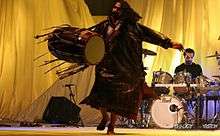Pakistani folk music
| Music of Pakistan | |
|---|---|
 | |
| Genres | |
| Specific forms | |
| Religious music | |
| Traditional music | |
| Media and performance | |
| Music awards |
Lux Style Awards Hum Awards Pakistan Media Awards |
| Music festivals |
All Pakistan Music Conference Lahore Music Meet |
| Music media | |
| Nationalistic and patriotic songs | |
| National anthem | Qaumi Taranah |
| Regional music | |
| Local forms | |
| Related areas | |
Folk music of Pakistan includes the traditional forms of Balochi, Pashto, Punjabi, Brahui and Sindhi folk songs and music. Pakistani folk songs include "Abeeti" (a love song sung by young women), "Allah Hoo" (a Muslim lullaby) and "Ashoor Jan" (a patriotic love song) and Jugni folk songs. Folktales include the epic love stories of lovers like Heer Ranjha, Sohni Mahiwal, Sassui Punnhun and Mirza Sahiban. Then, over the years as time went by, folk songs and folk music were developed by the people based on these folktales.
Badala (or Sandara) is a historically significant form of Pashto folk music that focuses on local romance, epics, folktales, fables, local heroes and historical events. Badala also includes Pashto translations of epics and romances from Arabic and Persian cultures.
Major folk singers
- Malika Pukhraj (sang in Kashmiri Dogari Pahari language)
- Tufail Niazi (sang in Punjabi language)
- Alam Lohar (sang in Punjabi language, especially famous for popularizing Jugni folk songs)[1]
- Arif Lohar (he is maintaining his father Alam Lohar's tradition as well as updating it by using more modern musical instruments)
- Pathanay Khan (sang in Saraiki language)[2]
- Muhammad Juman (sang in Saraiki language)
- Reshma (sang in Punjabi and Saraiki languages)
- Inayat Hussain Bhatti (sang in Punjabi as well as Saraiki languages)
- Allan Faqir (sang in Sindhi language)
- Faiz Muhammad Baloch (sang in Balochi language)
- Farida Khanum (sings in Punjabi language)
- Abida Parveen (sings in Saraiki language)[3]
- Attaullah Khan Esakhelvi (sings in Saraiki language)
- Suraiya Multanikar (sings in Saraiki language)
- Saieen Zahoor (sings in Punjabi language)
- Iqbal Bahu (sings in Punjabi language)
- Ghulam Ali (sings in Punjabi language)[4]
- Shaukat Ali (sings in Punjabi language)
- Surriya Khanum (sings in Punjabi and Saraiki languages)[5]
- Hamid Ali Bela (sang in Punjabi language)
- Sanam Marvi (sings in Punjabi, Saraiki and Sindhi languages)
- Rahim Shah (sings in Pashto language)
Kafi
The Sindhi kafi is an indigenous musical form of Sindh and Punjab, Pakistan. The word kafi, is of Ararbic origin, used in the sense of "final" or "enough" in the expression “Allah Kafi”, which means, “God Almighty is Supreme”. Thus the kafi is a devotional form of music composed in a particular form derived from a mixture of classical, semi-classical, and light music forms (specifically, the khayal, tappa, thumri, and geet). The mystic poetry of the Sufi saints is usually sung in this mode.
There is a Punjabi variant of kafi singing. Like Sindhi kafi, the mood and the theme of Punjabi Kafi may also be termed as secular and humanistic. In their Kafis, Shah Hussain (16th century) and Bulleh Shah (18th century) have adopted a strategy to communicate their thoughts, serving the humanity in a powerful and effective way. The satirical tone of these kafis, sometimes, depicts true picture of political situations and social conditions of their own days.
The Sindhi kafi is short, simple, and lucid in composition and tone. Shah Abdul Latif Bhitai, a renowned Sufi saint and mystic poet of Sindh (d. 1752), contributed considerably to the development of the Sindhi kafi, writing many verses and composing tunes which he named “The Sur of Shah Latif”. His tunes are still popular.
The late Zahida Parveen was a master of kafi singing. Her daughter, Shahida Parveen, possesses her mother's command of the form and her devotional urge. Yet today's trends, and perhaps necessity, have led her away from kafis and towards the geet, the ghazal, semi-classical and folk forms. Abida Parveen is another renowned kafi singer of Sindh, but she, too, sings in many other genres.
See also
References
- ↑ http://folkpunjab.org/alam-lohar/, Profile of Alam Lohar on folkpunjab.org website, Retrieved 19 June 2016
- ↑ http://tribune.com.pk/story/1062381/pathanay-khans-death-anniversary-goes-unnoticed/, Pathanay Khan's Pride of Performance Award info and profile on The Express Tribune newspaper, Published 9 March 2016, Retrieved 19 June 2016
- ↑ http://www.dawn.com/news/755357/india-honours-abida-parveen-with-life-time-achievement-award, India honours Abida Parveen with lifetime achievement award, Dawn newspaper, Published 9 Oct 2012, Retrieved 19 June 2016
- ↑ http://folkpunjab.org/ghulam-ali/, Profile of Ghulam Ali on folkpunjab.org website, Retrieved 19 June 2016
- ↑ https://www.youtube.com/watch?v=tIIgLhNT7SQ, Surriya Khanum performing in Coke Studio, Pakistan, videoclip on YouTube, Retrieved 19 June 2016